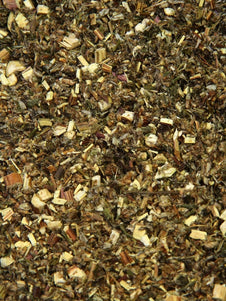
Mugwort Tea
75 reviewsMugwort Tea
75 reviews- In stock, ready to ship
- Inventory on the way
Mugwort (Artemisia vulgaris) is a bitter aromatic herb valued for centuries across Europe and Asia for its digestive, calming, and visionary properties. Traditionally used to support sleep, regulate cycles, and ease nervous tension, it’s also loved in modern tea rituals, herbal baths, and spiritual blends. Its aroma is earthy and slightly sage-like, with a long history of folk magic and medicine behind it.
- Traditionally used to support digestion, menstruation, sleep, and lucid dreaming
- May help with bloating, anxiety, muscle tension, and hormonal balance
- Popular for dream pillows, tea blends, baths, and herbal smudging
- Known for its mild sedative, antispasmodic, and bitter digestive actions
- Used in folk traditions for dreamwork, protection, and energetic cleansing
Tea: Steep 1–2 tsp in hot water for 10–15 minutes. Drink before bed or after meals. May be blended with peppermint, chamomile, or lavender for calming support.
Dream pillow: Place a small sachet under or near your pillow to encourage vivid dreaming or spiritual reflection.
Tincture: Take 2–4 mL (1:5) up to 2 times/day as a digestive bitter or sleep tonic. Avoid in pregnancy.
Baths & steams: Add strong infusion to bathwater or use for facial steam. Traditionally used for cramps, sleep, or energetic cleansing.
Smudging or incense: Burn dried herb in a heat-safe dish or bundle. Often used in rituals for purification or intention setting.
Mugwort is a herb with both practical and mystical appeal. Customers use it for gentle sleep support, womb steaming, digestive teas, or dream rituals. While many love it for dream recall and relaxation, some also use it in blends for gut health or calming nerves. Its taste is earthy and slightly bitter — often paired with honey, mint, or citrus. Use in moderation, and always store airtight to preserve its aromatic strength.
Do not use during pregnancy or while breastfeeding. Avoid large doses or prolonged use. Not recommended for children or with allergies to ragweed family plants. Monitor for sensitivity. Not for internal use with epilepsy unless guided.
- Actions: Bitter tonic, nervine, emmenagogue, antispasmodic, mild sedative, aromatic
- Systems: Digestive, nervous, reproductive, integumentary, energetic
- Energetics: Warming, drying, slightly bitter and pungent
- Pairings: Chamomile, skullcap, dandelion root, peppermint, yarrow, damiana
- Clinical note: Avoid in pregnancy or seizure disorders. Best used short-term or seasonally. Monitor if using with sedatives or liver medications.
This information is for general reference only. Consult a healthcare provider if pregnant, breastfeeding, taking medication, or managing chronic illness. Not recommended for children or seizure-prone individuals unless advised. Store dry and airtight.






